Sleeping for 5 Hours Wake Up Then Sleep Again?
Disclaimer - Nothing on this website is intended to exist a substitute for professional medical advice, diagnosis, or treatment... Read More Here .
Sleep issues tin can leave many of u.s. feeling helpless and at a loss for a quick fix. Unfortunately, waking upwards in the middle of the nighttime and being unable to become dorsum to slumber isn't uncommon, but that doesn't hateful the occurrence is necessarily healthy or expected.
Below we talk over a variety of reasons you may wake up in the middle of the night and outline a few pocket-sized steps to aid you wake up feeling refreshed.
Reasons Why We Wake upward at Nighttime
Night Terrors
Recent research has indicated that nighttime terrors may relate to your genetics. Too called "slumber terrors," these episodes are characterized by extreme fear, panic, and a temporary incapacity to regain full consciousness. In addition, stress, fatigue, and emotional distress are believed to trigger episodes at night.
Night terrors are more than mutual in children, but they appear in adults equally well. Ensuring you and your kids get enough sleep and managing stress should help.[one]
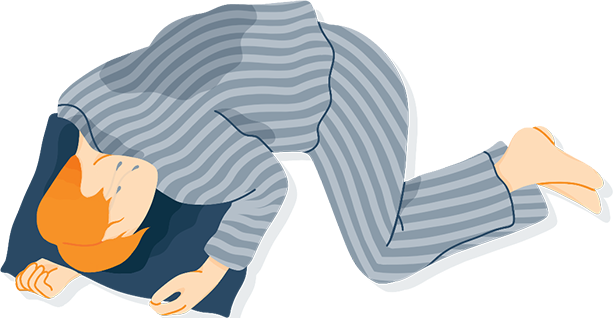
Sleep Apnea
Many Americans struggle with sleep apnea, which is characterized by the body ceasing to exhale at regular intervals throughout the night. Luckily, our bodies are incredibly sensitive and typically awaken to resume breathing; however, this however causes interrupted slumber.[2]
Many times, the enkindling is so cursory that nosotros won't remember it, but if you sleep with a partner, they may indicate out that you stop breathing at intervals during the night. At that place are devices called CPAP machines that help regulate your breathing. You lot may also desire to switch sleeping positions and lie on your side or get a wedge pillow to help go on you propped up if you lot're a back sleeper.
Read More: Signs of Sleep Apnea
Mental Health Problems: Feet, Depression, & Indisposition
People suffering from anxiety may experience regular panic attacks or have problem relaxing. Sticking with a calming nighttime daily ritual could aid rewire the body and mind, training it to respond to cues, indicating that information technology's fourth dimension to relax and go to slumber.
Low is oftentimes a precursor to sleep issues, so if you're struggling with sleep, your mental health may be the root cause.[3] Major Depressive Disorder affects over sixteen meg American adults in any given twelvemonth.
Loftier-pressure level jobs, children, family, and even traffic tin can trigger high levels of stress. Anxiety built up over a day, weeks, or months can make relaxing feel incommunicable when we finally crawl into bed. Prolonged feet can trigger insomnia and profoundly affect our sleep.
Find Out More: How Does Anxiety Bear on Your Sleep?
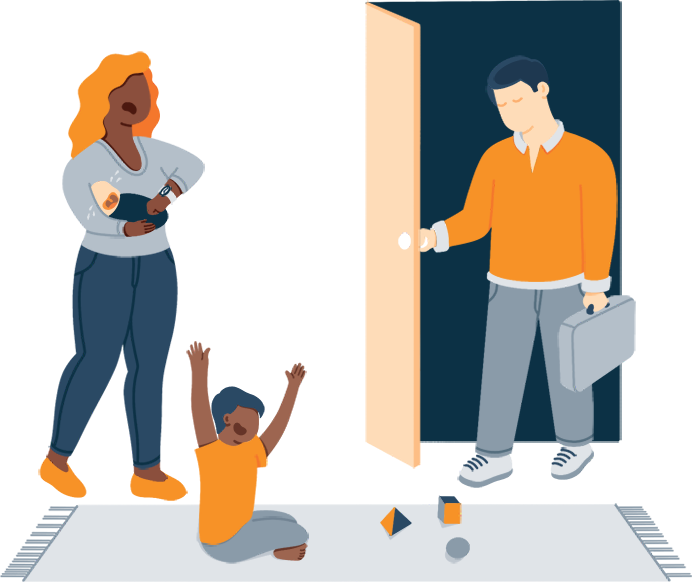
If you frequently imagine how yous're going to quit the side by side time your boss drops more work on your desk-bound on a Friday afternoon — we sympathize. However, information technology might exist beneficial to channel that free energy into something more mentally calming instead, like yoga or meditation. You could fifty-fifty escape with a nice bubble bath or novel.
View Our Guide: How to Cope With Stress and Sleep
Environmental Factors
A room that is too hot or likewise cold is a likely culprit in your stolen remainder. The ideal temperature of your chamber should be between 60 and 67 degrees, which may seem cold, but being too warm can impair our ability to sleep as well.[4]
When our bodies fix for sleep, our internal temperature drops. To stay asleep, humans have to maintain a temperature that'southward about a degree below the standard 98.6 degrees. When your chamber thermostat is set too high or low, information technology causes our body to work harder to maintain that equilibrium, which can wake us upwardly every bit a result.
Get More Info: Benefits of Sleeping in a Cold Room
Ways to Get Back to Sleep
Deep Animate
There are a variety of deep breathing techniques to assist with stress, feet, and sleep. Studies have shown that deep breathing techniques in conjunction with sleep hygiene may be highly effective in initiating sleep and falling dorsum to sleep when awoken in the middle of the night.[v]
Meditation
Meditating is a perfect way to clear the listen and help you lot sleep. You tin can access free and low-cost guided meditations through YouTube or an app, like Headspace. Many platforms offering fantastic guided sessions that facilitate relaxation, focus, deep animate, and sleepiness— perfect before bed.
Learn More: How to Meditate Earlier Sleep
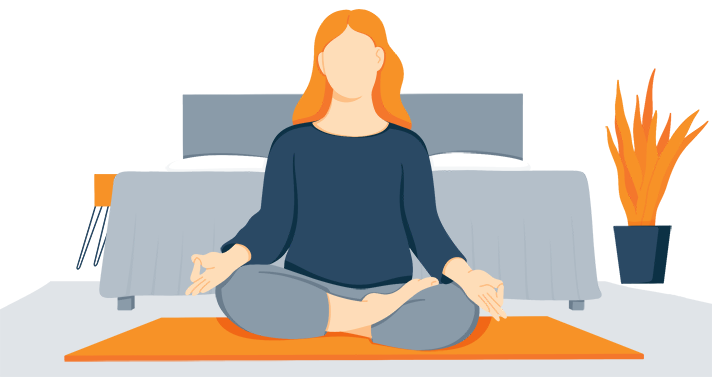
Progressive Muscle Relaxation
This technique is often done at the end of a yoga class, and information technology tin can work wonders for slumber, as it's known for its relaxation furnishings. You can exercise this past tensing (gently, not to the point of pain or cramping) and so relaxing each muscle in your body, starting with your feet and slowly moving up your unabridged body.[6]
How Do I Stay Comatose?
Establish a Bedtime Routine
To maximize the time you stay comatose, creating a routine can be extremely beneficial. Maintaining a regular schedule can help indicate to your body that it's time for bed and should work to relax you enough to migrate off easily.
Yous could comprise uncomplicated things like reading for 10 minutes, a warm shower or bathroom, or a cup of herbal tea. Even the act of brushing your teeth could be a powerful indicate that can railroad train your mind to cease internal churr and prepare for sleep. You could even cease the night with some stretching before bed.
Want to learn more? Visit our guide to relaxing bedtime rituals.
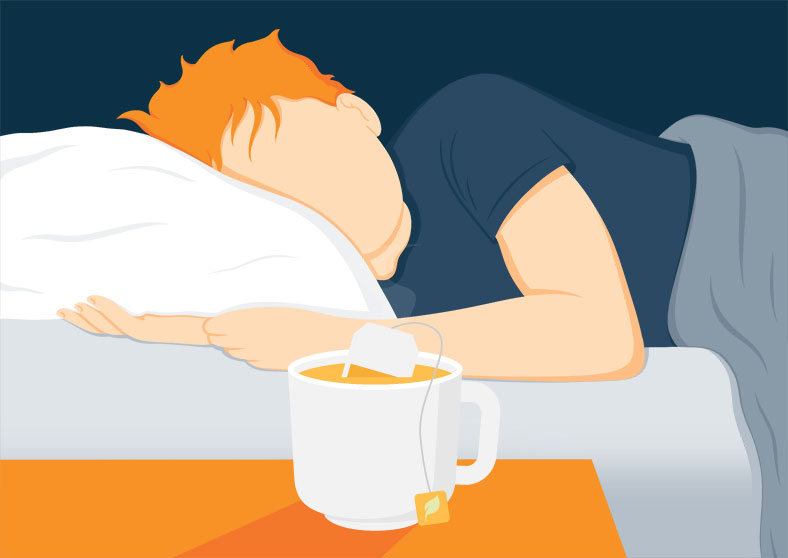
Make Your Sleeping room Conducive to Slumber
We mentioned earlier that your bedroom should resemble a cave. Aim for pitch darkness, a colder temperature, and consummate silence. Pocket-size slivers of light may seem harmless, just fifty-fifty a scrap of light can exist disruptive and mess with our circadian rhythm. Blackout curtains can be splendid for creating a dark oasis.
If you slumber with the Goggle box on, be sure it'southward switched off. Charge your phone in another room, and avoid nightlights.
Avoid Caffeine
Caffeine stays in your system long after your last loving cup. The exact number of hours varies, but research shows caffeine in healthy individuals may have up to nine and a half hours to eliminate from the body.[7]
Some individuals may take even longer depending on their torso. If your goal is to be asleep past 10 pm, be sure you're not drinking a 4 pm coffee to get through your afternoon slump.
Get More Info: Caffeine and Sleep
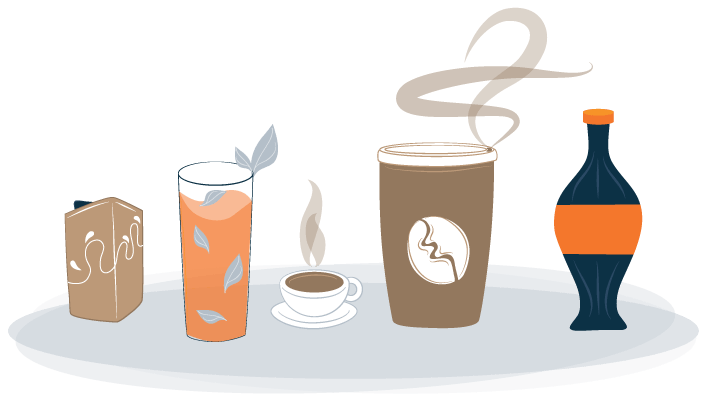
Frequently Asked Questions
What is middle insomnia?
Different indisposition, which is the inability to fall comatose, middle insomnia ways information technology'southward difficult for you lot to sleep during the center of the night. Waking upward betwixt 1 am and 4 am and not falling back comatose is the most common symptom of middle indisposition. However, times vary depending on the individual.[8]
Tin can I accept melatonin at 3 a.1000.?
Melatonin is great for inducing sleep, and information technology's a naturally occurring hormone in our bodies that can assistance you autumn asleep when you're jet lagged or feeling particularly broken-hearted earlier bed.
You lot can accept melatonin late at night or early in the morning, still, the dosage may leave you groggy when you lot wake up in the morning. We recommend speaking with your medico first, and starting with a small one or 3 mg dose. Melatonin can likewise be bought over-the-counter in 5 and 10 mg doses, just it'southward wise to start small.
Sources and References:
- [1] "Sleep Terrors", Stanford Wellness Care (SHC) – Stanford Medical Center, September 12, 2017
- [2] "Sleep Apnea", National Eye Lung and Blood Plant, U.Southward. Department of Health and Human Services
- [3] David Nutt, et al., "Sleep Disorders every bit Cadre Symptoms of Depression", Dialogues in Clinical Neuroscience, Les Laboratoires Servier, 2008
- [four] "What Is the Platonic Sleeping Temperature for My Bedchamber?", Nature and Scientific discipline of Sleep, Cleveland Clinic, October ix, 2020
- [5] Ravinder Jerath, et al., "Self-Regulation of Breathing as an Adjunctive Treatment of Indisposition", Frontiers in Psychiatry, Frontiers Media Southward.A., January 29, 2019
- [vi] "Stress Management: Doing Progressive Muscle Relaxation", Michigan Medicine
- [seven] "Pharmacology of Caffeine", Institute of Medicine (U.s.a.) Committee on Military Nutrition Research, January 1, 1970
- [eight] "Frequent Waking", Mayo Dispensary, Mayo Foundation for Medical Education and Research, August 23, 2019
Rachael Gilpin
Rachael is a content writer for Sleep Advisor who loves combining her enthusiasm for writing and wellness. She's had a passion for writing since she was a child when she wrote atrocious poetry. She's honed her craft quite a bit since then and considers herself a lucky duck to get paid to exercise what she loves.
Embracing the remote work life, she occasionally takes her work on the road and lives out her travel writer piping dream.
In her gratis fourth dimension, she attempts to meditate regularly, rides her cycle to Trader Joe's, and enjoys trying every type of food that she can become her hands on.

Emma Ashford
Emma Ashford is a Slumber Therapist, Founder of Sleep Seekers and speaks internationally on slumber didactics and insomnia. She is ane of the U.k.'s leading Sleep Experts and Insomnia Therapists. Emma is a highly-experienced psychotherapist, hypnotherapist, and sleep disorder coach; she has worked with hundreds of patients, applying her unique approach to help clients overcome insomnia.
Emma's work has been featured in The Guardian and Natural Health Magazine, and she has been featured on the BBC's Look N, advising on sleep during the Covid19 pandemic.

Katherine Hall
Katherine has over 13 years of clinical experience working in the public and private sector and is dedicated to improving sleep health.
Katherine has a post-graduate diploma in cerebral-behavioral psychotherapy and a bachelor'due south degree in psychology. She spends her workweek at Somnus Therapy with one goal in mind, to help people sleep better using natural and holistic approaches.
Source: https://www.sleepadvisor.org/waking-up-in-the-middle-of-the-night/
0 Response to "Sleeping for 5 Hours Wake Up Then Sleep Again?"
Post a Comment